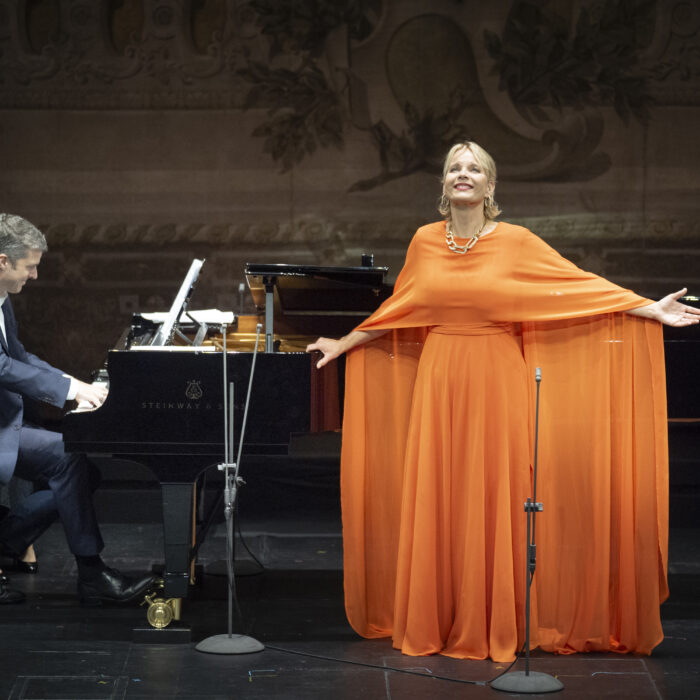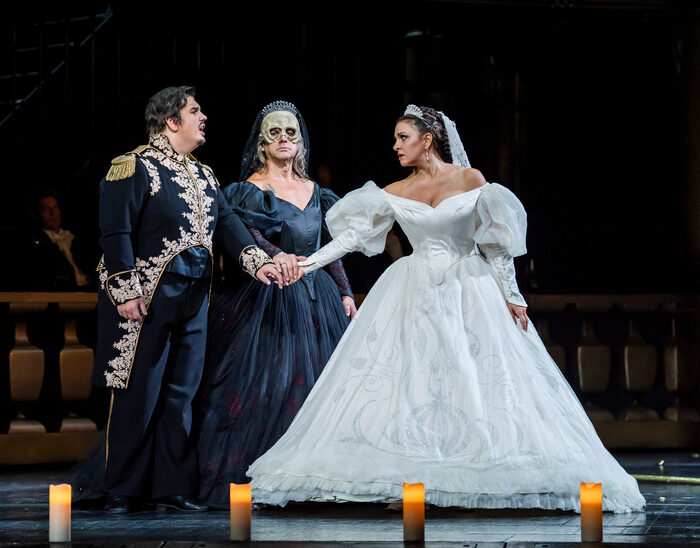
CD Review: B Records’ ‘La Belle Maguelone’
By Bob Dieschburg“La Belle Maguelone” or in German, “Die schöne Magelone,” is Brahms’ adaptation in 15 lieder of the Medieval romance of the troubadour Pierre, Count of Provence, and the Neapolitan Princess Maguelone. The story follows the well-trodden path of forlorn loves: Pierre falls head over heels for the beautiful Maguelone and as a token, presents her with three rings that his mother gave him at the very outset of his venture.
Unfortunately, Maguelone is supposed to marry someone else. Both desperate, the two lovers escape from the court of Naples only to land by the shore where a mischievous bird steals from Maguelone’s chest, the rings! Pierre follows them into the open sea but gets lost and after many trials manages to return to Provence where he retrieves the virtuous Maguelone whom he marries “in a great celebration (…) which lasted twenty-one days.”
Through the Ages
The fantastical elements to the narrative may seem archaic at first, but in Brahms’ treatment they play little to no role. Over the centuries the source material has, in fact, had many adaptations: from its first iterations in 15th century manuscripts to the dawn of Romanticism in Germany when Ludwig Tieck wrote the text which would then serve Brahms’ “La Belle Maguelone.”
Within his oeuvre “La Belle Maguelone” stands as the only cycle of songs and is, to some extent, operatic in nature. For it excludes the narrative element traditionally assigned to the recitativo to focus on the psychological impact of his 15 lieder, momentous and suggestive just like an aria.
Yet in B Records’ live recording from the Théâtre de l’Athénée it is not entirely absent; prose passages in French fill in the blanks and make for a striking contrast with the German song texts by Ludwig Tieck.
Live at Its Finest
Most remarkable, however, is the artistic skill set of baritone Stéphane Degout and mezzo Marielou Jacquard. In conjunction with Alain Planès, on the piano, they conjure a level of harmoniousness and technical eloquence which makes one all but forget that this is a live performance and not a carefully rehashed production from the studio.
Both singers demonstrate not only flawless pronunciation; they also convey the sentiment behind Brahms’ every melody and virtuoso display of musical writing. As such, they strike a fine balance between emotional intuition on the one hand, and studied, if not intellectual sophistication on the other.
The technical and especially the rhythmic demands are manifold, yet Degout and Jacquard follow in the footsteps of such greats as Elisabeth Schwarzkopf and Dietrich Fischer-Dieskau whose example, so dear to German repertoire, seems to have inspired the general gist at the Théâtre de l’Athénée.
The 11th lied, for instance, is a heart wrenching response to Pierre getting lost at sea while the 13th lied, “Geliebter, wo zaudert dein irrender Fuss,” carries in Jacquard’s rendition, all the anxiety and nervous anticipation of an imminent departure.
The ‘Beautiful Maguelone’ to Remember
Stéphane Degout impresses with his virile and heroic timbre. It is an ideal match to the Romantic portrayal of Pierre, Count of Provence, in whom some biographers even believe to recognize traits of Brahms himself.
Overall, his voice sounds focussed, malleable, and sensitive to variations in cadence and expression. It goes from the lighthearted to the grave and back with unassuming ease and, as such, reminds one of Florian Boesch, another superb interpreter of German songs and especially the near-contemporary Carl Loewe.
Marielou Jacquard, next to Degout, holds her own thanks to the honeyed tones of her mezzo. She may be a little less versatile than Degout, both technically and in terms of expressiveness; however, the five lieder in the cycle entrusted to her are a radiant contribution to a discography which has, traditionally, reserved its songs to baritones, most recently Thomas Oliemans (Linn Records, 2023) and Christian Gerhaher (Sony, 2017).
In addition, B Records’ release features the excellent Alain Planès whose piano not only provides support to the singers but finds its own voice as it oscillates between the melodramatic and virtuoso inflections of Brahms’ score.
“La Belle Maguelone” is a very enticing record, near-perfect in its execution and benefitting on top of everything else, from the unmistakable aura of a live performance.


